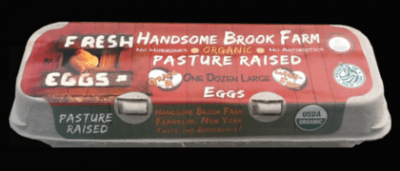Cornucopia’s Take: After two years of litigation, Handsome Brook, a marketer of certified organic and conventional eggs, and Humane Farm Animal Care (HFAC) have reached an out-of-court settlement, agreeing to pay their own court costs.
HFAC had sent emails to Handsome Brook’s retail outlets, claiming Handsome Brook’s certifications for organic and pasture-raised were not current. At the time of these allegations in 2016, Cornucopia had become aware that Handsome Brook had purchased several large orders of “organic” eggs from outside their network of contracted farmer-suppliers. Those eggs did meet the USDA organic standards. However, they did not conform with the company’s marketing representations in terms of their animal welfare practices (including being “pastured”) and were not certified by HFAC as was represented on the packaging.
After the first allegations became public in 2016, new owners took control of the management of Handsome Brook. They have been fully cooperative in our investigations of the company’s past conduct. We have found no evidence of current violations of law or misrepresentations taking place, and we have reinstated them as a four-egg operation on our scorecard. We will continue to closely monitor this brand.
Certified Humane label settles lawsuit with organic, pasture-raised egg brand
Sustainable Food News
HFAC’s Adele Douglass had emailed 36 grocery retailers urging supplier switch
 |
Handsome Brook Farm LLC (HBF), one of the largest U.S. producers of certified-organic pasture-raised eggs, and Humane Farm Animal Care, Inc. (HFAC), which administers the Certified Humane Raised and Handled label, have reached a compromise settlement in a two-year lawsuit.
Franklin, N.Y.-based HBF had brought a false advertising claim under the Lanham Act against HFAC in May 2016 in U.S. District Court for the Eastern District of Virginia (Case #: 1:16-cv-00592).
HBF was certified by the American Humane Association (AHA) in March 2016, becoming the only egg provider certified by AHA that is 100 percent pasture raised. HBF is also certified organic by USDA-accredited certifier Northeast Organic Farming Association of New York (NOFA-NY).
HBF contracts with more than 75 pasture-raised egg farms in New York, New Jersey, Virginia, Pennsylvania, Maryland, North Carolina and Kentucky, and sells organic, pasture-raised eggs in more than 4,000 grocery stores including Kroger, Publix, Sprouts, Whole Foods Market, Harris Teeter, Wegmans, other independent and natural retailers.
HBF sued after HFAC’s Executive Director, Adele Douglass, sent an email to 36 grocery retailers, including Whole Foods, Kroger, Costco, Target, Safeway, Wegman’s, Publ ix, Price Chopper, Harris Teeter, Albertsons and The Fresh Market, stating that HBF lacked up-to-date certifications to support its representations that its eggs are organic and pasture raised.
The email continued, “I hope you reconsider changing suppliers.”
HBF said that it lost existing and potential retailers as a result of the email. And, according to court documents, the record reflected that HBF’s “organic certifications were up-to-date and its pasture-raised certification had been recently audited.”
Herndon, Va.-based HFAC launched in 2003, and counts more than 170 companies, representing 6,000 farms and 835 million farm animals, that have been certified under its Standards of Animal Care, which are verified through farm inspections. The majority of HFAC’s revenue comes from royalties paid by licensees who use the Certified Humane label and inspection fees, both of which are necessary for a licensee to maintain HFAC certification.
For example, HFAC’s 2014 revenue was $739,562, and about 72 percent of that came from program services revenue, such as certification fees, according to court documents. The majority of HFAC’s revenue comes from the certification fees, which are based on the volume of eggs its licensees sell. HFAC-licensed egg producers must pay HFAC $0.05 per case of 30-dozen eggs that it sells under the Certified Humane label.
The district court issued a preliminary injunction in June 2016 prohibiting HFAC from circulating the email and requiring HFAC to publish a retraction email.
The case was then stayed in July 2016 while HFAC asked for an interlocutory appeal from the U.S. Court of Appeals for the Fourth Circuit, which subsequently agreed in August 2017 with the lower court’s judgment. An interlocutory appeal asks an appellate court to review a ruling before a case has been concluded.
The case was re-opened in October 2017 and the two sides continued to litigate. A jury trial was on the docket for June 25.
Meanwhile, HBF admitted in March to selling organic eggs labeled as ‘Pasture Raised,’ when in fact the eggs were sourced in late 2015 and early 2016 from producers not engaged in pasture-raising hens.
HBF also acknowledged that some farms within its “own farm network did not live up to its internal standards for pasture-raising,” according to a joint statement it released with the Organic Consumers Association (OCA) regarding the settlement of dueling lawsuits previously reported by Sustainable Food News.
OCA had sued HBF in Superior Court of the District of Columbia (Case #: 2016 CA 006223 B) in August 2016 alleging the company was misleading consumers by selling eggs that “do not fit consumer perceptions of ‘pasture raised.'”
HBF then filed a lawsuit in U.S. District Court for the District of Minnesota (Case #: 17-cv-05398) in December against OCA for its alleged “defamatory statements falsley accusing [HBF] of inhumane treatment of animals,” requesting a jury trial and judgment in excess of $2 million.
As part of the litigation settlement, HBF, which said in the joint statement that it has recently come under new management, “acknowledges shortcomings identified by OCA, including limited out-of-network purchases of organic eggs from producers in late 2015 and early 2016 that did not meet its pasture-raising criteria.”
It is not clear according to court documents what impact HBF’s admission in March had on the settlement with HFAC, which was announced last week. Nevertheless, the two parties agreed to bear their own court costs and fees and go their separate ways.
Story courtesy of the influential daily industry newsletter, Sustainable Food News. For subscription information: https://www.sustainablefoodnews.com/register.php

